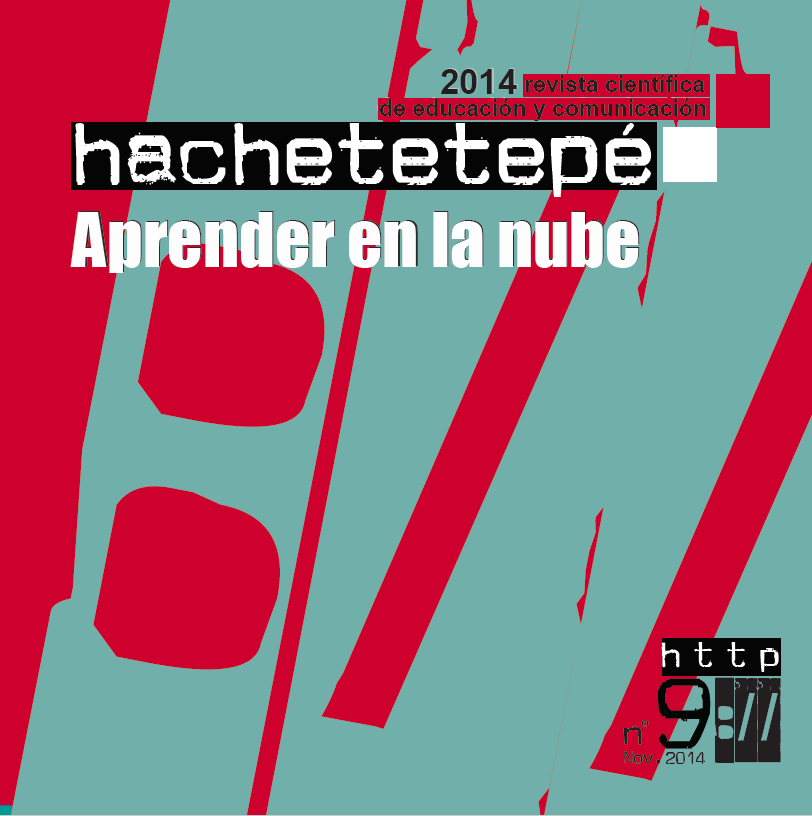El conectivismo, o aprender en nubes de conexiones

DOI
https://doi.org/10.25267/Hachetetepe.2014.v2.i9.12Información
Resumen
Este artículo presenta la teoría del Conectivismo voluntariamente haciendo caso omiso de la presente controversia académica sobre los MOOCs, una metodología derivada. Presentamos puntos esenciales de la teoría original intentando mostrar su relevancia en la sociedad actual donde el poder de las redes y la velocidad de las conexiones se incrementan cada día. Repasamos las metodologías y pautas de los autores de la teoría para su puesta en práctica terminando con los límites de la teoría.
Palabras clave
Descargas
Cómo citar
Licencia

Esta obra está bajo una licencia internacional Creative Commons Atribución-NoComercial-SinDerivadas 4.0.
Aquellos autores/as que tengan publicaciones con esta revista, aceptan los términos siguientes:
- Conservarán sus derechos de autor y garantizarán a la revista el derecho de primera publicación de su obra, el cual estará simultáneamente sujeto a la Licencia de reconocimiento de Creative Commons. Se pueden copiar, usar, difundir, transmitir y exponer públicamente, siempre que se cite la autoría, la url, y la revista, y no se usen para fines comerciales. No se permite hacer obras derivadas.
- Podrán adoptar otros acuerdos de licencia no exclusiva de distribución de la versión de la obra publicada (p. ej.: depositarla en un archivo telemático institucional o publicarla en un volumen monográfico) siempre que se indique la publicación inicial en esta revista.
- Difundir su obra a través de Internet (p. ej.: en archivos telemáticos institucionales o en su página web) una vez que el manuscrito sea aceptado, lo cual puede producir intercambios interesantes y aumentar las citas de la obra publicada. (Véase El efecto del acceso abierto)
Hachetetepé. Revista científica de educación y comunicación no cobra honorarios ni por la presentación de manuscritos ni por la publicación de sus artículos.
Citas
Aïm, O., Allard, L., Menrath J.y Vergopoulos H. (2013). “Vie intérieure et vie relationnelle des individus connectés. Une enquête ethnographique”. Fédération française des Télécoms, diaporama, septembre 2013.(http://www.fftelecoms.org/sites/fftelecoms.org/files/contenus_lies/vie_interieure_vie_relationnelle_mai_2013.pdf.) (Recuperado en abril 2014).
Asimov, I., (1988). “Entrevista con Isaac Asimov by Bill Moyers”. (http://www.youtube.com/watch?v=1CwUuU6C4pk) (Recuperado en abril 2014).
Bauman, Z. (2013). Liquid modernity. John Wiley & Sons.
Bell, F. (2011). “Connectivism: Its Place in Theory-Informed Research and Innovation in Technology-Enabled Learning”. International Review of Research in Open & Distance
Learning, 12 (3). (http://www.irrodl.org/index.php/irrodl/article/view/902/1664) (Recuperado en abril 2014).
Berners-Lee, T. (2010). “Long Live the Web: A Call for Continued Open Standards and Neutrality,” Scientific American, November 22. (www.scientificamerican.com/article.cfm?id=long-live-the-web). (Recuperado en abril 2014).
Boyd, D. (2010). “Streams of content, limited attention: The flow of information through social media”. Educause Review, 45 (5); 26-28.
(http://www.educause.edu/ero/article/streams-content-limited-attention-flow-information-through-social-media) (Recuperado en abril 2014).
Comisión Europea. “Opening up Education –a proposal for an European Initiative to enhance education and skills development through new technologies,
(http://ec.europa.eu/smart-regulation/impact/planned_ia/docs/2013_eac_003_opening_up_education_en.pdf.) (Recuperado en abril 2014).
Castells, M. (2004). 1. “Informationalism, networks, and the network society: a theoretical blueprint”. The Network Society, 3. (http://annenberg.usc.edu/Faculty/Communication/~/media/Faculty/Facpdfs/Informationalism%20pdf.ashx) (Recuperado en abril 2014).
Chomsky, N. (2012). “The Purpose of Education”.
(http://www.learningwithoutfrontiers.com/2012/02/noam-chomsky-the-purpose-of-education/) (Recuperado en abril 2014).
Downes, S. (2012). Connectivism and Connective Knowledge: essays on meaning and learning networks. National Research Council Canada. (http://www.downes.ca/files/books/Connective_Knowledge-19May2012.pdf) (Recuperado en abril 2014).
Freire, P. (1993). Pedagogy of the Oppressed. 1970. New York: Continuum. (http://www.users.humboldt.edu/jwpowell/edreformFriere_pedagogy.pdf) (Recuperado en abril 2014).
Hernández, D. R. (2012). Socionomía: ¿vas a perderte la revolución social? (Vol. 12). Madrid: Planeta.
Illich, I. (1971). Deschooling Society. Marion Boyars, London and New York. (http://www.arvindguptatoys.com/arvindgupta/DESCHOOLING.pdf) (Recuperado en abril 2014)
Ito, M., Gutiérrez, K., Livingstone, S., Penuel, B., Rhodes, J., Salen, K. y Watkins, S. C. (2013). Connected learning: An agenda for research and design. Digital Media and Learning Research Hub.(http://dmlhub.net/sites/default/files/ConnectedLearning_report.pdf) (Recuperado en abril 2014).
Kop, R., y Hill, A. (2008). Connectivism: Learning theory of the future or vestige of the past? International Review of Research in Open & Distance Learning, 9 (3). (http://www.irrodl.org/index.php/irrodl/article/view/523/1103). (Recuperado en abril 2014).
Kop, R. (2011). “The challenges to connectivist learning on open online networks: Learning experiences during a massive open online course”. The International Review of Research in Open and Distance Learning, Special Issue-Connectivism: Design and Delivery of Social Networked Learning, 12 (3).(http://www.irrodl.org/index.php/irrodl/article/view/882/1823). (Recuperado en abril 2014).
Mackness, J., Mak, S., y Williams, R. (2010). “The ideals and reality of participating in a MOOC. In Networked Learning Conference”. University of Lancaster; 266-275. (http://eprints.port.ac.uk/5605/1/The_Ideals_and_Realilty_of_Participating_in_a_MOOC.pdf) (Recuperado en abril 2014).
Robinson, K. (2006). “Las escuelas matan la creatividad”. V. TED, Entrevistador.( http://www.youtube.com/watch?v=nPB-41q97zg) (Recuperado en abril 2014).
Roig Vila, R. (2010). “Innovación educativa e integración de las TIC: un tándem necesario en la sociedad de la información”. (http://rua.ua.es/dspace/bitstream/10045/14883/5/Roig%202010.pdf) (Recuperado en abril 2014).
Seltzer, K., y Bentley, T. (1999). The creative age: knowledge and skills for the new economy. Demos. (http://www.culturenet.cz/res/data/004/000574.pdf) (Recuperado en abril 2014).
Shirky, C. (2010). Cognitive surplus: Creativity and generosity in a connected age. Penguin UK.
Siemens, G. (2006). Knowing knowledge. (http://www.lulu.com/product/paperback/knowing-knowledge/545031?productTrackingContext=search_results/search_shelf/center/4#detailsSection.) (Recuperado en abril 2014).
Siemens, G. (2010). Conociendo el conocimiento. Ediciones Nodos Ele. (http://www. nodosele. com/editorial.) (Recuperado en abril 2014).
Trilling, B., y Fadel, C. (2009). 21st century skills: Learning for life in our times. John Wiley & Sons.
Vázquez Cano, E., Meneses, E. L. y Sánchez-Serrano, J. L. S. (2013). La expansión del conocimiento en abierto: los MOOC. Barcelona: Octaedro.





